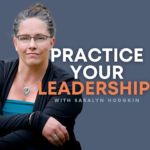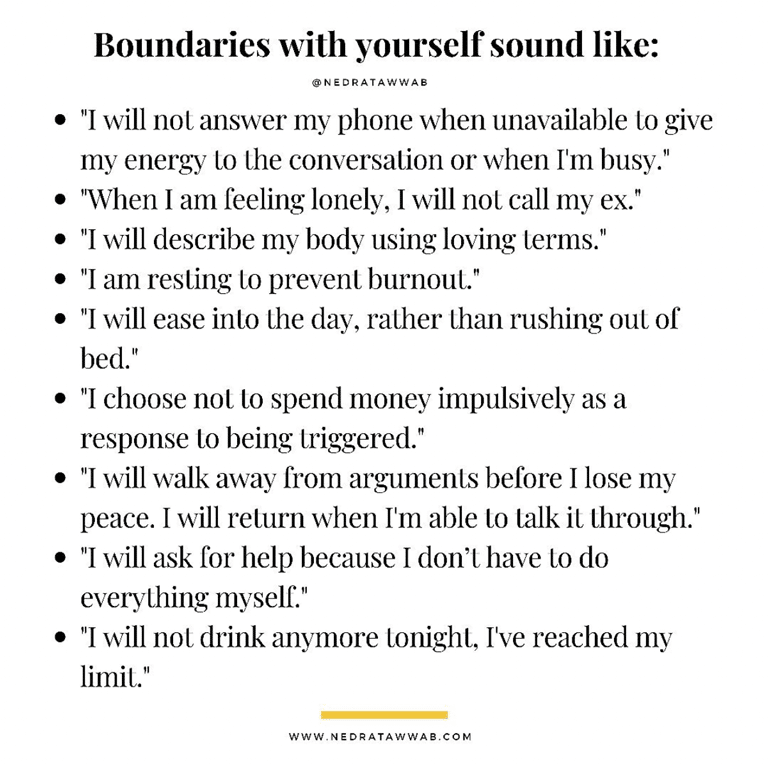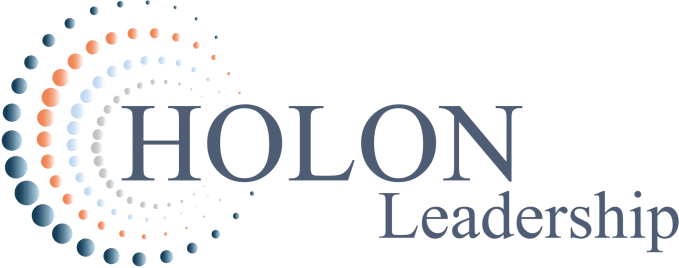Hey everyone, I’m Saralyn Hodgkin. And this is the podcast to practice your leadership.
Boundaries. I don’t know about you, but I’m finding the work that I need to do personally around boundaries is just it’s important. Gosh, it’s hard. So hard. And I talk about it a lot. I talk about it with my kids with, with my one on one coaching clients, with teams, with my partner, with my buddies, with my mama group. Everywhere. The conversation is everywhere.
Why are they so damn important? Here’s a, here’s a quote from from Brene Brown. “Daring to set boundaries is about having the courage to love ourselves, even when we risk disappointing others.” Oh, like talk about, what do you mean, I can’t just please people? Oh, hold on, I got to really actually know what I want? I gotta stand up for myself? I got to be my own self advocate? And I don’t have to go on the treadmill of explaining and putting my foot in my mouth like some one or two word answers are examples of practicing and voicing boundaries? Hard.
Hard when we are in a, or at least I am in a society where it is normed, the norm construction around people pleasing is ever present. And explaining yourself is ever present and expected in so many realms. And I just find that boundary work. And the courage that it takes is not necessarily something I’ve been brought up with as being socially acceptable. And yet it’s required. It is required to again, quoting Brene Brown, it’s required to set boundaries. It’s required to have the courage to love ourselves. It’s required to do so even when we risk disappointing others.
Talk about self authoring your path. So for me, when I think of boundaries, it’s around setting your limits. It’s about self care. And when I am saying self care, it’s totally like a pamper moment and go get a massage and do a little imass no problem. But we’re talking Audre Lorde’s description of self care. Caring for myself. This is a quote from her – “Caring for myself is not self indulgence. It is self preservation. It is an act of political warfare.”
That’s powerful coming from a black lesbian mother warrior poet, who dedicated her life and her work to such extreme and justices and felt that the system was against her. And that self care wasn’t about being self indulgent, it was trying to show up in a system, again, looping back to what I said earlier, that has norms and structures that does not value self preservation. And as Audre Lorde says, caring for yourself is self preservation. And that is it is an act of political warfare. Self care.
Boundaries are important because you communicate your needs, because guess what, they’re important. They’re important because they’re yours. Own that. How are you going to go about owning that? Boundaries are important because it helps you focus your empathy. It helps you focus your empathy, which allows you to have self compassion, compassion for others. It helps you come into vulnerable spaces, which allows you to come into places of joy. Setting those boundaries helps you find peace. There’s a book that came out in 2021 here, Set boundaries,find peace: a guide to reclaiming yourself by Nedra Glover Tawwab. Set boundaries, find peace.
So what do boundaries mean? I usually turn to Brene Brown’s inventory of trust, which uses the definition of boundaries of, you respect my boundaries and when you’re not clear about what’s okay and not okay, you just you ask me, you just ask me. And you’re willing to say no. What’s okay and not okay, I’m clear about what that is. And I’m going to communicate it. Of course, this means that there are other elements to this around having generous assumptions about trying to come from places of non judgment and, and so on, but just staying in here on boundaries, you’re clear about what’s okay and not okay. And you’re willing to say no, that in itself is a serious warrior, stance and action.
If you start losing yourself, and what everybody else wants, then who are you being for everybody else, because helping others, being in the presence of others shouldn’t, shouldn’t hurt, shouldn’t bring you down. So the author that I mentioned, has a great Instagram account. Their handle is @NedraTawwab, and she has some really great posts around what boundaries with yourself sound like, like I’m resting to prevent burnout. Thanks, period. I’ll ask for help before I’m overwhelmed, before it’s my last resort, that’s my practice.
I will describe my body using loving terms. Just another one around, sometimes how it takes strength, how it takes strength to show up in your boundaries to talk about issues, instead of holding everything inside. About keeping your opinions to yourself when it may not be helpful. Boundaries don’t mean just sharing everything and anything to everybody. It’s about discernment around what do I share? And what do I not? What’s okay, what’s not okay, as you stand in, in a place in alignment with how you want to be.
And so, you know, of course, the advantages of having healthy boundaries around developing your autonomy and your identity and avoiding burnout. Or as I talk somewhere else around compassion fatigue, and just having some good health all around and being a model for others, sometimes it’s hard to set up those personal boundaries and my invitation to you is break out that journal or those voice memos, however you capture and integrate, and can you name three boundaries that will work for you that you’re working towards, or that you already know, just write down three boundaries. Identify them.
Then can you practice communicating them, say what you need, maybe start with some really safe places, your best friend, your partner, whatever tha safe place looks for you. Maybe it’s where you show up and pray, wherever that means for you. And then, when you’re communicating those, just keep it simple. And short. You do not need to over explain in any way. It can sound too short sometimes. But that’s the point is that you’re not trying to explain yourself, you’re communicating a boundary. And in that boundary statement, of course, you can say why it’s important.
So again, Nedra Tawwab, has on her Instagram account, has a whole post around boundaries with yourself sound like dot, dot, dot, and she has a bunch of quotes, right? So it’s good to go and maybe, maybe take a look at those and various resources. Because all, setting your boundaries, knowing your boundaries, communicating your boundaries, allows you to set them, have the courage to use them, allows you to be a model of loving yourself and even when you risk disappointing others, you are standing in your path, self authoring your path. Do your work all, stay in the practice.
Thanks all. I’m Saralyn. You can find me at holonleadership.org. I walk alongside you as you practice your leadership.



 Apple Podcasts
Apple Podcasts Spotify
Spotify Google Podcasts
Google Podcasts